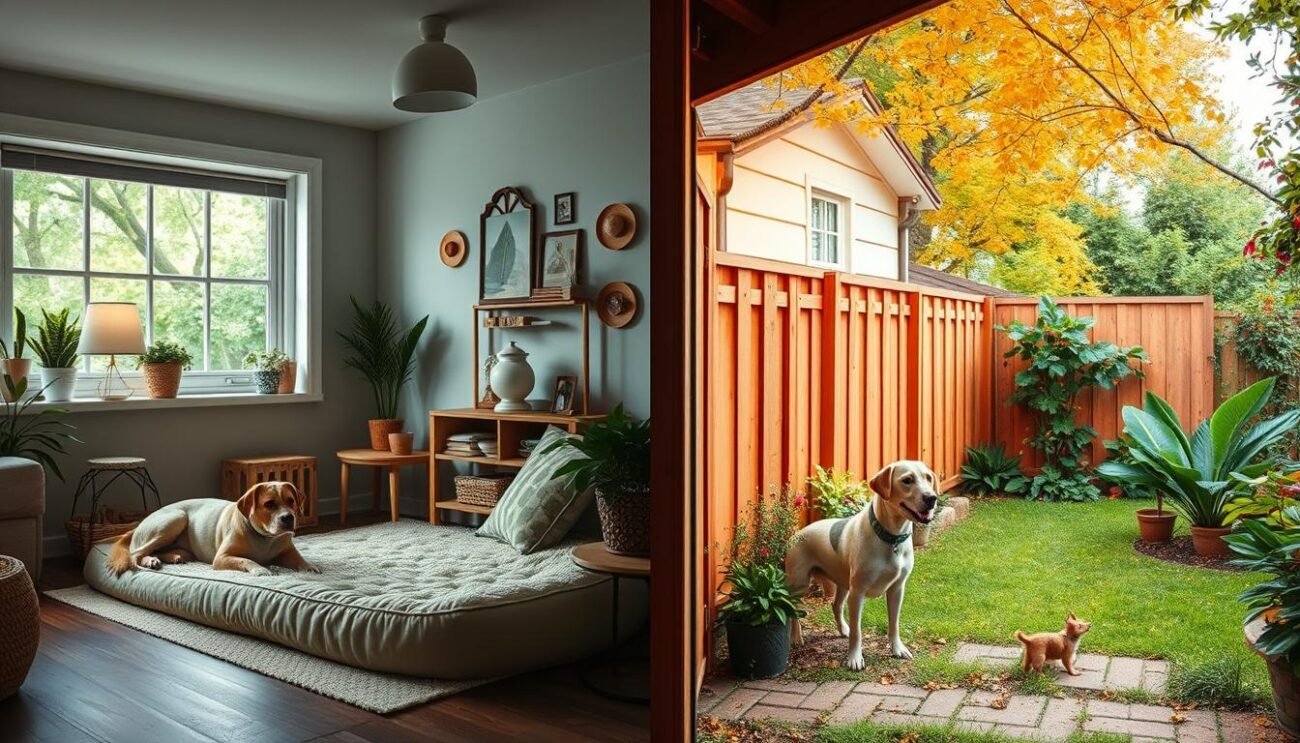If your dog’s constant barking is driving you crazy, you’re not alone. Excessive barking is a common problem. But, with the right approach, you can solve it and make your home peaceful again.
This guide will help you understand why dogs bark and how to stop it. You’ll learn effective training methods and practical solutions. Whether your dog barks due to boredom, anxiety, or territorial reasons, we’ve got you covered. You’ll find ways to make your dog happy and well-behaved.

Key Takeaways
- Understand the common causes of dog barking, including territorial instincts, boredom, and separation anxiety.
- Learn positive reinforcement techniques to effectively train your dog to reduce excessive barking.
- Discover practical solutions for indoor and outdoor settings to curb barking and maintain a peaceful environment.
- Recognize the role of environmental factors, such as noise triggers and distractions, in contributing to your dog’s barking behavior.
- Explore the pros and cons of various dog barking control devices and determine the best approach for your unique situation.
Understanding the Causes of Dog Barking
Figuring out why your dog barks is the first step to solving this common issue. Dogs bark for many reasons, like protecting their territory or feeling bored and lonely. Knowing the reasons helps you find the right ways to stop them from barking too much.
Territorial Barking
Dogs naturally want to guard their territory and things they care about. If they see something they think is a threat, they bark to warn and scare it away. This territorial barking is a big reason dogs bark.
Boredom and Loneliness
Dog barking also happens when dogs are bored or lonely. Dogs are smart and need to stay active and engaged. Without enough play and mental challenges, they might bark a lot because they’re bored and lonely.
Knowing why dogs bark, like because of territory or boredom, is key to solving the problem. By tackling these reasons, you can help create a quieter, happier home for you and your dog.
Excessive Dog Barking: A Nuisance to Neighbors
As a responsible dog owner, it’s key to tackle dog barking problems that bother your neighbors. Excessive barking dog complaints can harm community ties and lead to legal trouble. By finding out why your dog barks too much and fixing it, you keep peace with those nearby.
When dogs bark a lot, it gets on your neighbors’ nerves, more so at odd hours. It ruins their quiet time and affects their happiness. Solving these dog barking problems shows you care and helps avoid future issues.
To keep your neighbors happy and your relationship strong, manage your dog’s barking behavior. Find out why they bark too much, like boredom or fear, and teach them to stop. This way, you help your dog and your neighbors.
“A barking dog is often more annoying than a tooth ache.” – Sidney Smith
By tackling dog barking problems early, you make your neighbors’ lives better and build a closer community. Being a good pet owner means thinking about others’ comfort too.

Dog Barking: A Natural Canine Vocalization
Dog barking is not just a nuisance; it’s a natural way for dogs to communicate. They use barking to show emotions like excitement or distress. It also helps them alert others to potential dangers or changes.
Communicating Emotions
Dogs are very expressive, and barking is a big part of that. A high-pitched bark might mean they’re excited or happy. On the other hand, a low growl could show fear or anger. Knowing these canine vocal expressions helps us understand our dogs better.
Alerting to Potential Threats
Barking is also a way for dogs to warn of dangers. It could be a stranger coming near or something they sense in their environment. This instinct to bark and alert others is a leftover from their days as pack animals.
“Barking is a natural way for dogs to communicate with their pack and the world around them. Rather than trying to eliminate this behavior, it’s important to understand its purpose and find ways to channel it constructively.”
Seeing dog barking as a key part of their behavior helps us deal with it better. We can use training to help them bark less when it’s not needed. This way, our dogs can still express themselves while keeping peace in our homes and communities.
Training Your Dog to Stop Barking
Teaching your dog not to bark is key to a happy home. Use positive methods and stay consistent. This way, you can stop your dog from barking too much and enjoy a better relationship with them.
Positive Reinforcement Techniques
Positive reinforcement is the best way to train your dog. Give them treats, praise, or their favorite toys when they’re quiet. This shows them that being quiet is good and makes them want to do it again.
You can also teach them commands like “speak” and “quiet.” This lets them bark in a controlled way. When they’re quiet, give them a treat right away. This helps them learn the command faster.
Consistency and Patience
Being consistent and patient is crucial when training your dog. Set a regular training time and make sure everyone in the house follows it. This helps your dog know what’s expected and makes training easier.
Also, be patient with your dog. Changing their barking habits takes time and practice. Celebrate small wins and stay positive. A calm and encouraging environment helps your dog learn better.

By using positive reinforcement and consistent, patient training, you can stop your dog’s excessive barking. This makes them a well-behaved and responsive friend.
Dog Barking Solutions for Indoor and Outdoor Settings
As a dog owner, you might have noticed your dog barks differently inside and outside. Luckily, there are many indoor dog barking solutions and outdoor dog barking solutions. These help manage your dog’s barking in both places.
For indoor settings, setting up “quiet zones” can really help. These areas should be away from things that might make your dog bark, like busy streets or loud parts of your home. Also, using sound-masking devices like white noise machines or calming music can block out noises that might make your dog bark.
- Establish quiet zones free from barking triggers
- Use sound-masking devices to minimize external noises
- Provide ample mental and physical stimulation to reduce boredom-related barking
For outdoor settings, it’s important to manage the environment. Make sure your dog’s outdoor area is safe and doesn’t have things that might make them bark, like people walking by or animals. You can use physical barriers, like fences or hedges, to block their view. Also, giving them fun toys and activities can keep them busy and less likely to bark a lot.
- Create a secure and visually-restricted outdoor space
- Offer engaging toys and activities to prevent boredom-related barking
- Utilize deterrents, such as motion-activated devices, to discourage outdoor barking
Every dog is different, so what works for one might not work for another. By using a mix of indoor and outdoor solutions, you can reduce your dog’s barking. This helps keep your home peaceful for you and your neighbors.

Addressing Separation Anxiety and Excessive Barking
Separation anxiety is a big reason for dogs barking too much. When dogs miss their owners, they bark a lot. Boredom also makes dogs bark, as they look for something to do and attention.
Providing Mental and Physical Stimulation
It’s key to keep your dog’s mind and body busy. Regular walks, playtime, and dog sports help. They also keep boredom and separation anxiety barking at bay.
Interactive toys and tough training sessions also help. They keep your dog’s mind sharp and stop boredom barking.
- Invest in puzzle toys, snuffle mats, and other canine enrichment activities to keep your dog’s brain stimulated when you’re away.
- Engage in training exercises that challenge your dog’s problem-solving skills, reinforcing positive behaviors.
- Gradually accustom your pet to being left alone, using positive reinforcement to ease the transition.
Meeting your dog’s needs can stop too much barking. This makes your dog happy and well-adjusted.

“A bored dog is a noisy dog. Keeping your canine companion mentally and physically engaged is the key to reducing excessive barking.”
The Role of Environmental Factors in Dog Barking
Understanding your dog’s barking is key. Environmental factors like noise and sights can trigger a lot of barking. By managing these triggers, you can make your home quieter for your dog.
Noise Triggers and Distractions
Loud noises, like sirens or construction, can scare your dog and make them bark. Visual distractions, like cars or strangers, can also cause barking. Knowing what triggers your dog’s barking is the first step to solving the problem.
- Find out what sounds and sights make your dog bark a lot.
- Try to reduce or remove these triggers, like closing windows or using sound-absorbing materials.
- Give your dog a quiet, cozy spot to go when things get too loud.
By tackling the environmental triggers and making your home quieter, you can help your dog feel safer. This will reduce their need to bark due to distractions.
| Environmental Factor | Potential Impact on Dog Barking | Mitigation Strategies |
|---|---|---|
| Loud Noises | Increased noise-related barking | Soundproofing, white noise machines, desensitization training |
| Unfamiliar Sights | Excessive barking due to distractions | Gradual exposure, positive reinforcement training, providing a safe space |
| Outdoor Stimuli | Environmental barking triggers related to territorial instincts | Fencing, visual barriers, redirecting attention to alternative activities |
By understanding and managing environmental factors, you can make your home a happier place for you and your dog.

Dog Barking: A Form of Attention-Seeking Behavior
Dogs may bark to get your attention. They might have learned that barking gets them treats or playtime. This attention-seeking barking can be annoying if not stopped.
To fix this, don’t give in to reinforcing barking behavior. Don’t give treats or attention when they bark. Instead, give rewards and praise when they are quiet and calm.
- Teach your dog the “quiet” command, and reward them with treats and praise when they stop barking on command.
- Provide plenty of mental and physical stimulation through interactive toys, training sessions, and regular exercise to prevent barking for rewards.
- Ignore the barking behavior and only give attention when your dog is calm and quiet.
With patience and consistency, your dog will learn that barking for attention doesn’t work. Reward the calm behavior instead. Your dog will learn that being quiet is the best way to get your praise and affection.

“The key to stopping attention-seeking barking is to reward the quiet behavior, not the barking itself.”
Dog Barking Control Devices: Pros and Cons
As a pet owner, you might think about using anti-barking devices or barking control tools. These tools aim to stop your dog’s loud barking. But, it’s important to know their good and bad sides before deciding. We’ll look at how well different barking deterrents work and help you choose the best one for your dog.
Ultrasonic Anti-Barking Devices
Ultrasonic anti-barking devices make high-frequency sounds to stop dogs from barking. These sounds are too high for humans to hear but might bother dogs. But, they might not work for all types of barking.
Citronella or Spray Collars
Citronella or spray collars spray a harmless but smelly spray when a dog barks. They can help stop barking. But, you need to watch them closely to avoid upsetting your dog.
Electric Shock Collars
Electric shock collars are not recommended. They can be cruel and might hurt your dog more than help. These collars shock dogs when they bark, which can make them more scared and anxious. It’s better to use kinder training methods.
Positive Reinforcement Training
Think about using positive reinforcement training instead of just devices. This method rewards your dog for being quiet. It’s a good way to teach your dog to bark less over time. With patience and consistency, your dog can learn to communicate better and bark less.
Managing your dog’s barking requires looking at all options. Choose the safest and most kind way for your pet. Knowing the good and bad of different devices helps you make a better choice for you and your dog.

When to Seek Professional Help for Dog Barking Issues
Training your dog to stop barking can be done on your own. But, there are times when you need a pro’s help. When should you look for a dog trainer or animal behaviorist to solve your dog’s barking problem?
If your dog keeps barking even after you’ve tried everything, it’s time to get help. A dog trainer or behaviorist can offer new insights and strategies. They can help you tackle the problem more effectively.
Signs It’s Time to Consult a Professional
- Your dog’s barking is disrupting your neighbors.
- The barking is linked to aggression or anxiety.
- You’ve tried many training methods, but the barking doesn’t stop.
- Your dog’s barking might be due to separation anxiety.
By working with a behaviorist, you can find out why your dog barks. They can create a plan just for your dog. They’ll watch your dog, find out what triggers the barking, and suggest special ways to stop it.
Benefits of Professional Assistance
- They’ll give you a plan that fits your dog’s needs.
- They can spot any health or mental issues.
- They’ll teach you how to manage your dog’s environment.
- They’ll help you keep up the good work over time.
Getting professional help for dog barking can really change things. It gives you the tools and knowledge to stop your dog’s barking. Don’t wait to consult a dog trainer or behaviorist if you’re not getting results.

| Service | Average Cost | Considerations |
|---|---|---|
| Dog Trainer Consultation | $50 – $150 per session | Focused on teaching specific obedience and behavioral skills |
| Animal Behaviorist Evaluation | $200 – $500 for initial assessment | In-depth analysis of underlying causes and tailored treatment plan |
“Seeking professional help for dog barking can be a game-changer, providing you with the tools and expertise needed to effectively curb your canine’s excessive vocalization.”
Conclusion
In this guide, you’ve learned many ways to stop your dog’s barking. You now know why dogs bark, like when they feel territorial or bored. You can use special training to help your dog be quieter and happier.
To stop your dog from barking, use positive training, be consistent, and patient. Also, fix any problems in their environment and get help if you need it. These steps can make your home peaceful again, whether your dog barks inside or outside.
Remember, there are many ways to solve dog barking problems. You can help your dog feel less anxious, keep them busy, and reduce noise distractions. With the right steps, you and your dog can live in peace and happiness together.
FAQ
What are the common causes of dog barking?
Dogs bark for many reasons. They might be protecting their territory, feeling lonely or bored, or seeking attention. They can also bark due to separation anxiety.
How can excessive dog barking become a nuisance to neighbors?
Too much barking can strain relationships with neighbors. It might even lead to legal problems. It’s crucial to solve barking issues to keep peace in the community.
Is dog barking a natural form of canine communication?
Yes, barking is a natural way for dogs to communicate. They bark to express feelings and warn of dangers or changes.
What training techniques can help stop a dog from barking?
Positive reinforcement works well. Reward your dog for being quiet and teach them new commands. Being consistent and patient is key.
How can environmental factors contribute to a dog’s barking?
Things like noise and sights can make dogs bark. Knowing what triggers their barking helps create a calmer space for them.
Is barking a form of attention-seeking behavior in dogs?
Yes, sometimes dogs bark to get attention or rewards. To stop this, reward them for being quiet and avoid giving in to their barking.
What are the pros and cons of using dog barking control devices?
There are many barking control devices out there. It’s important to know their pros and cons before deciding if they’re right for your dog.
When should I seek professional help for my dog’s barking issues?
If your dog’s barking doesn’t stop or gets worse, it’s time to get help. A professional dog trainer or animal behaviorist can help find the root cause.







